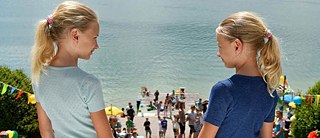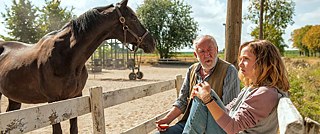German Film Festival 2018
Kino for Kids: Today’s children, tomorrow’s cinephiles

As part of the ‘Kino for Kids’ program six German-language features are making their Australian premieres at the 2018 German Film Festival. Eager cinephiles-in-waiting can explore a range of films. For ‘Kino in Oz’ Sarah Ward picks her three to look out for.
As well as an all-encompassing love of cinema, every movie buff shares something else: a particularly resonant, important memory of seeing a film on the big screen as a child. It’s the type of experience that famous filmmakers often talk about — German director Tom Tykwer worked at his local art house theatre as a teenager and would repeatedly watch Blade Runner, for example — and it’s always a defining moment; a time when the love of cinema firmly crystallises inside young minds.
It’s also an experience that this year’s German Film Festival aims to offer, as part of its Kino for Kids program. Courtesy of six German-language features all making their Australian premieres at the festival, eager cinephiles-in-waiting can explore a range of films for younger audiences. When the cinema curtains part, the cinema lights dim and the projector starts, viewers will feast their eyes on the screen and hopefully make their own movie-watching memories.

ROCK MY HEART
It might seem as though Rock My Heart’s general premise errs on the side of convenience, and it does; however that’s just the starting point for this rousing, gorgeously shot drama. Here, horse-crazy 17-year-old Jana (Lena Klenke), who suffers from a heart defect, finds a new lease on life thanks to an errant horse called Rock My Heart. And, while she’s not supposed to get her blood pumping as it aggravates her illness, she trains and prepares to race him anyway.While the teenager might initially connect with the creature for the easiest, most obvious of reasons, the basis of their bond proves a recognisable reflection of the way that the smallest of details can provide motivation, solace and happiness during tough times. Supported by Dieter Hallervorden as Rock My Heart’s owner Paul and Emilio Sakraya as Jana’s boyfriend Sami, Klenke takes viewers through a relatable teen journey as her character copes with facing the future — and its many uncertainties and hardships — as best she can.
ROBBY & TOBY'S FANTASTIC VOYAGER
A film squarely for younger viewers, Robby and Toby’s Fantastic Voyager taps into two childhood favourites: adventure and technology. Every kid dreams of a life more exciting than their own. Every kid wonders how their existence can be improved by gadgets. For eleven-year-old budding inventor Toby (Arsseni Bultmann), they’re about to combine and inspire an eye-opening and humorous journey.Following the boy’s escapades with an alien robot called Robby (voiced by Jonah Rausch), the movie doesn’t venture too far into the unexpected — even for those unfamiliar with the 1967 book Robbi, Tobbi und das Fliewatüüt, or the 1972 TV series of the same name — but it does offer a spirited ode to the power of friendship. It’s the latest family-friendly effort for director Wolfgang Groos, who also boasts television’s Rudi the Racing Pig, the Vampire Sisters films and The Pasta Detectives 2 on his resume.
LOTTE & LUISE: TWINS ON BOARD
A story of twins separated at birth, meeting as pre-teens, discovering they look identical but have completely opposing personalities, and realising that they’re actually sisters raised by divorced parents, Erich Kästner’s Lottie and Lisa has enjoyed a long and varied history. First conceived as an idea for a film during World War II, it was published as a book in 1949, and has since formed the basis for nearly 20 screen adaptations.Indeed, both in 1961 starring Hayley Mills and in 1998 with Lindsay Lohan, the two Parent Trap films might rank among the most famous versions; however Lotte & Luise: Twins on Board follows admirably in their footsteps. Featuring real-life sisters Mia and Delphine Lohmann, rather than one actress playing two roles, the narrative benefits from modern technological advancements — and the Lancelot von Naso-directed effort benefits from its spirited lead performances in general.